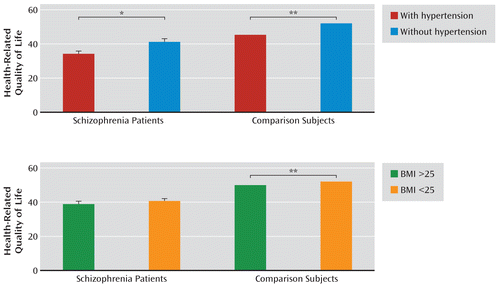Impact of Hypertension and Body Mass Index on Quality of Life in Schizophrenia
To the Editor: We were pleased to read the article by Joseph I. Friedman, M.D., and colleagues in the October 2010 issue of the Journal (1). The article highlights the negative impact of individual cardiovascular risk factors, particularly hypertension, on memory performance in patients with schizophrenia, and suggests that proper treatment of these risk factors may improve cognitive outcomes in these patients.
Pronounced memory deficits have been linked to low quality of life in patients with schizophrenia (2). In recent years, the importance of predictors of quality of life on treatment outcomes among these patients is being recognized (3). We analyzed quality of life among patients with schizophrenia who had hypertension and a body mass index (BMI) >25 as reported in the National Epidemiologic Survey on Alcohol and Related Conditions (N=43,093), a large representative U.S. survey. This survey assessed substance use and mental and physical disorders, including history of schizophrenia, as well as self-reported hypertension and a high BMI in the past 12 months.
We measured quality of life using the 12-item Short-Form Health Survey, a norm-based general health scale, for eight subgroups: participants with schizophrenia with and without hypertension (N=134 and N=252, respectively) or with and without a BMI >25 (N=251 and N=125, respectively) and healthy comparison subjects (participants without schizophrenia) with and without hypertension (N=9,002 and N=33,705, respectively) or with and without a BMI >25 (N=16,983 and N=24,295, respectively). We adjusted all measures for age, gender, education, and ethnicity in all models. We included the vascular risk factor of interest (hypertension or elevated BMI) and the presence or absence of a schizophrenia diagnosis in the main effect model. The interaction between a schizophrenia diagnosis and the vascular risk factor was entered in a second step. We used Taylor linearization to adjust standard errors of means of estimates for complex survey sampling design effects including clustering data, and used the REGRESS procedure in the SUDAAN software package (4).
Hypertension, but not a BMI >25, had a significant negative impact on quality of life in patients with schizophrenia (Figure 1). We found no significant interaction between schizophrenia and a BMI >25 on quality of life.

FIGURE 1. Health-Related Quality of Life for Patients With Schizophrenia and Comparison Subjects With and Without Hypertension and With and Without a Body Mass Index (BMI) Over 25
*p<0.001. **p<0.0001.
Friedman et al. (1) stress the importance of addressing individual cardiovascular risk factors in patients with schizophrenia. The dissociation between the effect of hypertension and a BMI >25 on quality of life in these patients is in line with this. Our findings stress the importance of screening for and treating hypertension in patients with schizophrenia, given its association with a poorer quality of life in this patient population.
1. : The effects of hypertension and body mass index on cognition in schizophrenia. Am J Psychiatry 2010; 167:1232–1239Link, Google Scholar
2. : The cognitive neuroscience of memory function and dysfunction in schizophrenia. Biol Psychiatry 2008; 64:18–25Crossref, Medline, Google Scholar
3. : Subjective and objective quality of life in schizophrenia. Schizophr Res 2008; 98:201–208Crossref, Medline, Google Scholar
4.



